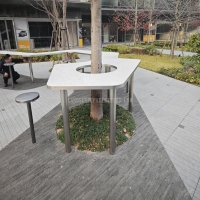Welcome to the website for landscape facilities products and knowledge.
What are the environmental impacts of producing plastic versus metal landscape trash cans?
The production and disposal of landscape trash cans, whether made of plastic or metal, have significant environmental implications. Understanding these impacts helps in making sustainable choices for waste management.
Plastic Trash Cans:
1. Production Impact: Plastic is derived from fossil fuels, requiring energy-intensive processes that emit greenhouse gases. The extraction and refining of petroleum contribute to air and water pollution.
2. Durability & Lifespan: While lightweight and resistant to rust, plastic cans degrade under UV exposure, leading to shorter lifespans and frequent replacements.
3. Recycling Challenges: Many plastics end up in landfills or oceans due to inefficient recycling systems. Even recyclable plastics often downcycle into lower-quality products.
Metal Trash Cans:
1. Production Impact: Metal production (e.g., steel or aluminum) demands high energy, often from coal, but metals are infinitely recyclable without quality loss. Mining activities can cause habitat destruction and water contamination.
2. Durability & Lifespan: Metal cans are sturdy and long-lasting, resisting weather and physical damage. Their longevity reduces the need for replacements.
3. Recycling Efficiency: Metals have high recycling rates, with aluminum recycling saving up to 95% of the energy required for primary production.
Key Comparisons:
- Carbon Footprint: Plastic has a lower initial carbon footprint, but metal’s recyclability offsets its higher production emissions over time.
- Waste Accumulation: Plastic waste persists for centuries, while metal cans are more likely to be repurposed or recycled.
- Eco-Friendly Alternatives: Biodegradable plastics or recycled metals can mitigate environmental harm.
Conclusion:
Metal trash cans, despite higher production emissions, offer better sustainability due to durability and recyclability. Plastic cans, though cheaper, contribute to long-term pollution. Choosing recycled materials or hybrid designs can further reduce environmental impacts.
By weighing these factors, communities and businesses can adopt waste solutions that align with ecological goals.
Related search:

Recommendation
An outdoor bar counter with stainless steel and terrazzo materials in an irregular shape